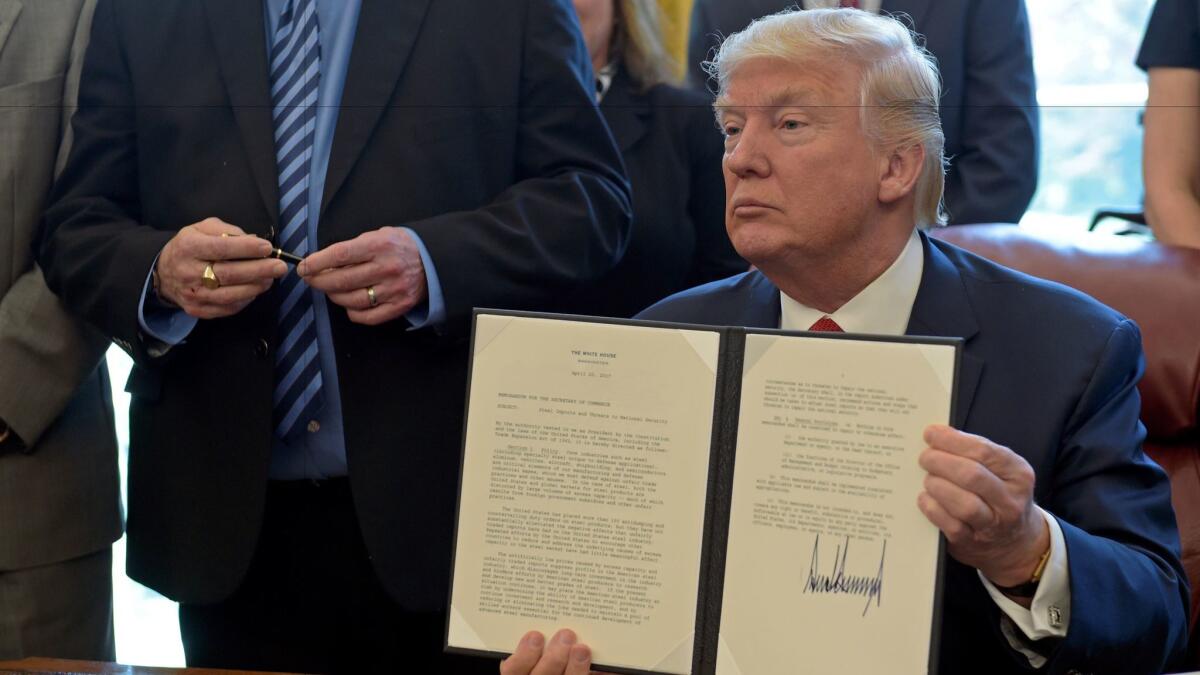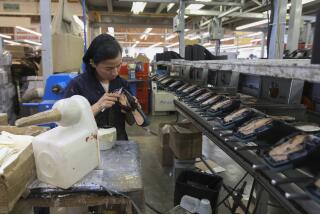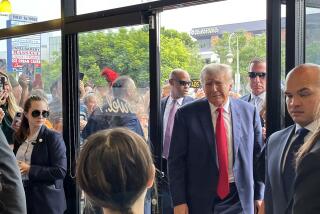Trump administration launches national security investigation into steel imports

The Trump administration directed the Commerce Department on Thursday to expedite an investigation into whether the way other countries sell steel compromises U.S. national security.
In a briefing Thursday morning, Commerce Secretary Wilbur Ross said the review would consider how much steel the U.S. needs to defend itself, and whether current domestic capacity meets those requirements. Steel imports now make up more than 26% of the U.S. marketplace, and the report will examine to what extent those imports impinge on U.S. economic and national defense security, Ross said.
That investigation officially began Wednesday night, and Trump signed the memorandum to expedite the investigation at a ceremony Thursday.
The investigation could result in a recommendation that the United States impose broad tariffs on the steel industry, Ross said. “The important question is protecting our defense needs. And we will do whatever is necessary to do that, but we’ve come to no conclusion yet because the study is just recently begun.”
The investigation — which was initiated by the Commerce Department, not the steel industry — revives a section of a little-used trade law, the 1962 Trade Expansion Act. Section 232 of the law allows the government to impose a wide variety of barriers on steel imports for national security reasons. It does not focus on a particular country, but analysts say the order is likely to be wielded against China, which has about half of the world’s steel capacity and has flooded the global market with cheap steel in recent years.
Thursday’s executive order showed the administration pushing ahead with promises to use existing trade laws to crack down more heavily on what it considers unfair trading practices, coming a week after President Trump appeared to walk back some of the most prominent economic promises of his campaign.
Last week, Trump declined to label China a currency manipulator despite campaign promises to do so, and he expressed support for the Export-Import Bank after previously criticizing the credit agency.
The president made bold and often inflammatory promises about trade policy on the campaign trail, pledging to renegotiate the North American Free Trade Agreement and impose tariffs of 45% on imports from China and 35% on U.S. companies that moved manufacturing facilities to Mexico.
Since coming into office, his actions on trade have been more muted. The president signed an official memorandum withdrawing the United States from the Trans-Pacific Partnership on Jan. 23 and signed two executive orders directing review of trade practices on March 31.
The United States has not used Section 232 since 1995, when the creation of the World Trade Organization provided other channels to crack down on countries that violate international trade practices. Yet the Trump administration has expressed skepticism about the efficacy of the WTO and said it would consider going around the organization.
The current patchwork of steel-related cases brought under the WTO are “very, very limited in nature to a very, very specific product from a very, very specific country,” Ross said Thursday. “It’s a fairly porous system. And while it has accomplished some fair measure of reduction, it doesn’t solve the whole problem.”
Scott Paul, president of the Alliance for American Manufacturing, which represents steelworkers and the industry, said the investigation “hopefully could provide some breathing space for the steel industry.”
“Getting at China’s overcapacity in steel and the scale of it is exceptionally difficult to do through conventional application of trade law. It may take an extraordinary measure, like Section 232, to make some progress and to prod China along as well,” Paul said.
The law gives the Commerce secretary 270 days to report the findings of an investigation to the president, and an additional 90 days for the president to make a decision on the information, though Ross said the investigation probably would take less time than that.
The U.S. steel industry has been shedding jobs for decades, partly because of the development of steel furnaces that are increasingly efficient and automated, and partly because of the growing capacity in countries such as China.
Some analysts say that if the U.S. were to restrict steel imports, that could raise the price of steel for U.S. companies and make it harder for those countries to compete internationally.
In the briefing, Ross said this consideration would be weighed in the Commerce Department’s ultimate report. “It’s a question of balancing one’s priorities,” he added.
Swanson writes for the Washington Post.






